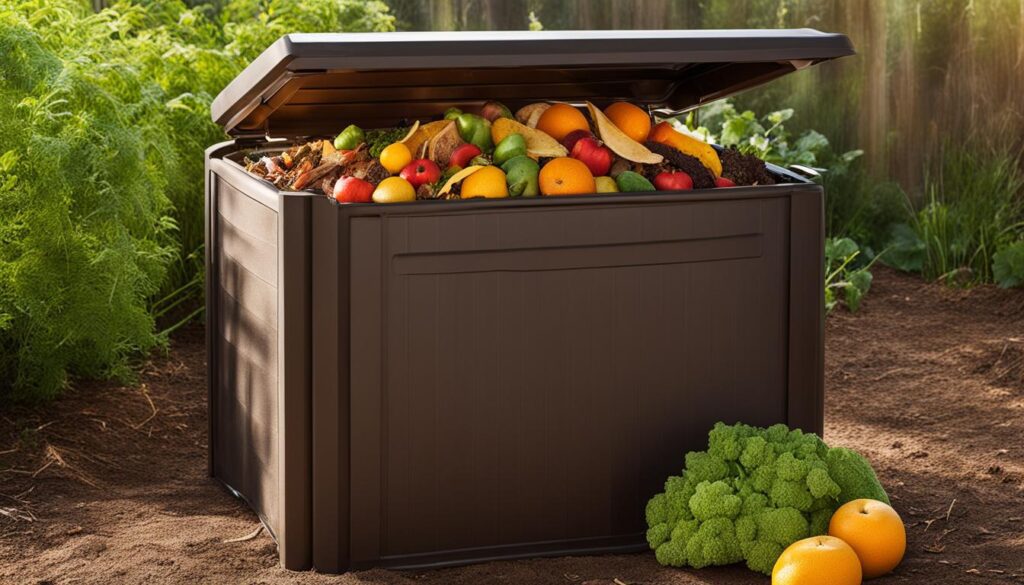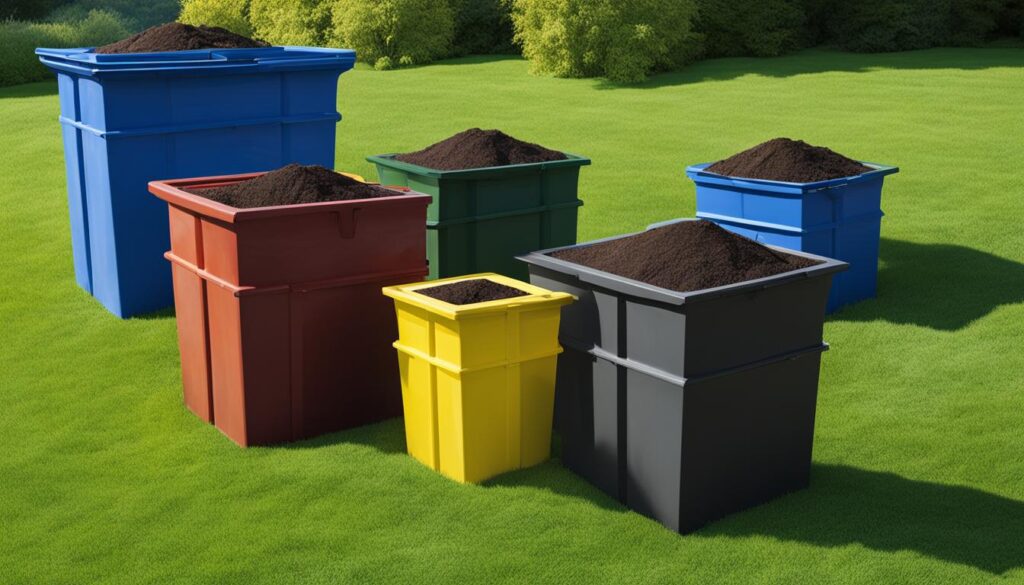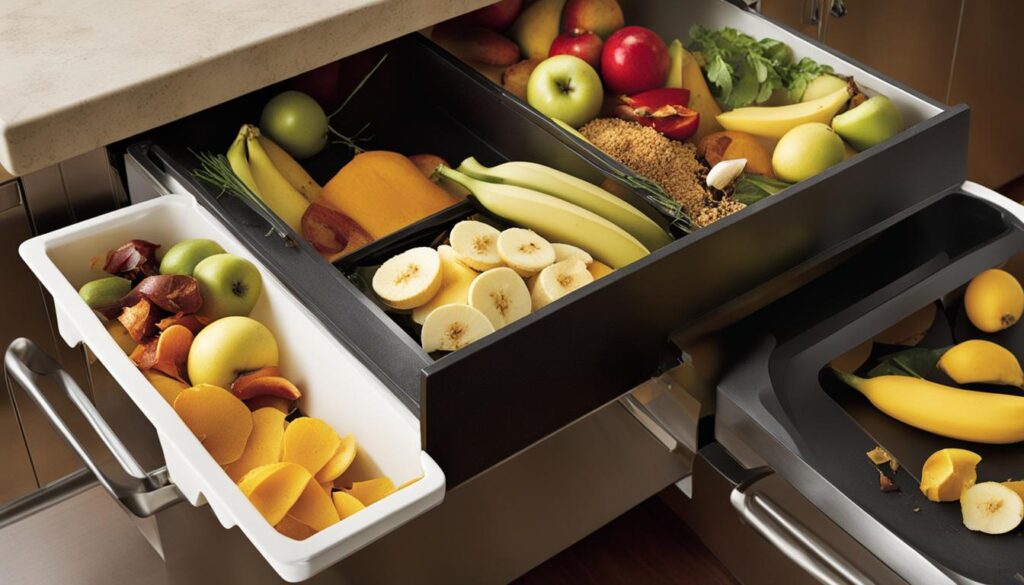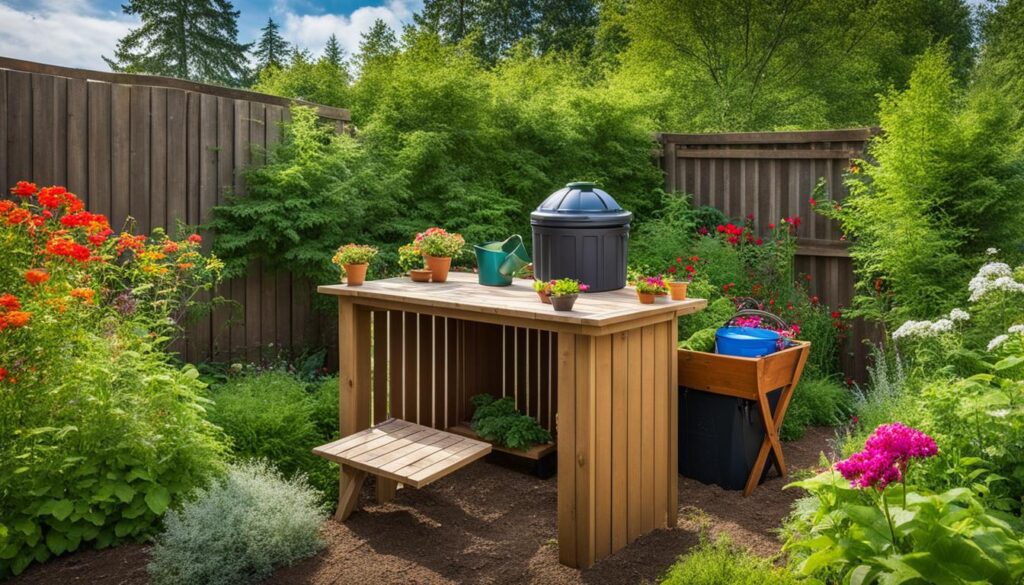Composting is an eco-friendly way to manage organic waste and contribute to sustainable living. Choosing the right composter for home use is essential to make composting easy and efficient. We have researched and compiled a list of the best composters available, along with expert-backed tips to help you get started with home composting.
Key Takeaways
- Composting is an eco-friendly way to manage organic waste and contribute to sustainable living.
- Choosing the right composter for home use is essential for easy and efficient composting.
- We have researched and compiled a list of the best composters available.
- Expert-backed tips will help you get started with home composting.
- Start composting today and make a positive impact on the environment.
Understanding Compost Bins: What are they and How to Choose One?
Compost bins are essential tools for managing organic waste materials and creating nutrient-rich compost for your garden. These containers come in various shapes and sizes, and choosing the right one is crucial for effective composting. When selecting a compost bin, consider factors such as ease of assembly, suitability for your dwelling type, good odor control, and pest resistance.
Compost bins are designed to decompose organic waste materials, such as kitchen scraps, yard trimmings, and biodegradable items. They provide an environment where these materials can break down naturally, resulting in nutrient-rich compost that can be used to enhance soil quality and promote healthy plant growth. By using a compost bin, you can divert organic waste from landfills, reduce greenhouse gas emissions, and contribute to sustainable living.
There are different types of compost bins available, including tumblers, vermicomposters, and backyard bins. Tumblers are rotating bins that allow for easy mixing and faster decomposition. Vermicomposters use worms to break down organic waste, providing high-quality compost and worm castings. Backyard bins are larger containers that accommodate a higher volume of organic waste, suitable for those with ample outdoor space.
By choosing the right compost bin, you can turn your organic waste into a valuable resource and create nutrient-rich compost for your garden.
Factors to Consider when Choosing a Compost Bin:
- Size and Capacity: Consider the amount of organic waste you generate and choose a bin that can accommodate your needs.
- Assembly and Maintenance: Look for bins that are easy to assemble, use, and maintain. Some bins may require regular turning or monitoring.
- Odor Control: Opt for bins with effective odor control mechanisms to prevent unpleasant smells.
- Pest Resistance: Choose bins that are designed to keep pests, such as rodents and insects, out of your compost.
- Aesthetics: If the compost bin will be visible in your backyard or kitchen, consider its appearance and choose a design that suits your taste.
Understanding compost bins and choosing the right one can make your composting journey more efficient and rewarding. With the right bin, you can easily manage your organic waste and create nutrient-rich compost to nourish your plants and contribute to a more sustainable future.

Best Compost Bins for Home Use
When it comes to home composting, having the right compost bin can make all the difference. We have done the research and put together a list of the best compost bins available. Whether you’re a beginner or an experienced composter, there’s a bin on this list that’s perfect for you. Let’s take a look at some of the top options:
1. FCMP Outdoor Dual Chamber Tumbling Composter
This tumbler composter offers convenience and efficiency with its dual chamber design. You can add waste to one side while the other side decomposes, ensuring a continuous supply of nutrient-rich compost. The sturdy construction and easy assembly make it a top choice for backyard composting.
2. FCMP The Essential Living Composter
This vermicomposter utilizes the power of worms to break down organic waste quickly. It features a stackable design that allows you to add trays as your worm population grows. With its compact size, it’s perfect for those with limited space or who want to compost indoors.
3. The Earth Machine NPL 300 Compost Bin
This backyard composter is a classic choice. With its large capacity and adjustable ventilation, it provides the perfect environment for composting. The pest-resistant lid and easy assembly make it ideal for those looking to create a sustainable garden.
4. Subpod Recycled Mini
If you’re looking for a stylish and innovative composting solution, the Subpod Recycled Mini is for you. This in-ground compost bin not only composts your waste but also encourages the growth of beneficial worms. It discreetly fits into your garden and makes composting a breeze.
5. Seed & Sprout Compost Bin
For those with a smaller kitchen space, the Seed & Sprout Compost Bin is the perfect choice. Its compact size and sleek design make it an attractive addition to any countertop. The bin is equipped with a charcoal filter to control odors, ensuring a pleasant composting experience.
6. Bamboozle Kitchen Compost Bin
If style is a priority, the Bamboozle Kitchen Compost Bin will not disappoint. Made from sustainable bamboo fiber, this bin adds a touch of elegance to your kitchen while helping you reduce waste. It features a removable inner bucket for easy cleaning and odor control.
7. OXO Good Grips Compost Bin
If you’re on a budget, the OXO Good Grips Compost Bin is a great option. This compact bin fits neatly on your countertop or under the sink. It comes with a convenient handle for easy transport and a flip-up lid for effortless waste disposal.
Whichever compost bin you choose from this list, you can rest assured that you’re getting a quality product that will make composting at home a breeze. Happy composting!
| Compost Bin | Suitable For | Key Features | Price Range |
|---|---|---|---|
| FCMP Outdoor Dual Chamber Tumbling Composter | Backyard | Dual chamber design for continuous composting | $100-$150 |
| FCMP The Essential Living Composter | Indoor | Stackable design for expanding worm population | $75-$100 |
| The Earth Machine NPL 300 Compost Bin | Backyard | Large capacity with adjustable ventilation | $80-$120 |
| Subpod Recycled Mini | Backyard | In-ground design with worm cultivation | $150-$200 |
| Seed & Sprout Compost Bin | Kitchen | Compact size with charcoal filter for odor control | $20-$30 |
| Bamboozle Kitchen Compost Bin | Kitchen | Sustainable bamboo fiber construction with removable inner bucket | $30-$40 |
| OXO Good Grips Compost Bin | Kitchen | Compact size with flip-up lid and handle | $15-$25 |

How to Use a Compost Bin Effectively
Using a compost bin effectively is crucial for successful composting. By following the right techniques and practices, you can turn your organic waste into nutrient-rich compost for your garden. Here are some essential tips to help you get the most out of your compost bin:
1. Balance Your Greens and Browns
For a healthy composting process, it’s important to maintain a balance between your greens (nitrogen-rich materials) and browns (carbon-rich materials). Greens include kitchen scraps, grass clippings, and fresh leaves, while browns include dry leaves, shredded paper, and wood chips. Aim for a ratio of roughly 2 parts browns to 1 part greens to ensure proper decomposition.
2. Maintain Proper Moisture Levels
Moisture is vital for the composting process as it helps break down the organic materials. Your compost pile should be damp, like a wrung-out sponge. If it becomes too dry, add water; if it becomes too wet, add more browns to absorb the excess moisture. Regularly check the moisture levels and adjust as needed.
3. Turn the Compost Regularly
Turning your compost helps aerate the pile and distribute oxygen, which is essential for decomposition. Use a pitchfork or a compost turner to mix the materials thoroughly. Aim to turn the compost every few weeks to promote faster decomposition and prevent any foul odors.
4. Avoid Adding Certain Materials
To maintain a healthy and odor-free compost bin, avoid adding meat, dairy products, oily foods, and pet waste. These materials can attract pests and cause unpleasant odors. Stick to plant-based kitchen scraps, yard waste, and other organic materials that are safe and beneficial for composting.
By following these composting tips, you can ensure effective and efficient composting in your home. Remember to be patient, as the composting process takes time. With the right techniques and a little bit of effort, you’ll soon have nutrient-rich compost to nourish your plants and contribute to a more sustainable lifestyle.
The Environmental Benefits of Home Composting
Home composting offers numerous environmental benefits that contribute to sustainable living and organic waste management. By diverting food waste from landfills, composting helps reduce greenhouse gas emissions, including methane, which is a significant contributor to climate change. According to the Environmental Protection Agency (EPA), food waste makes up about 22% of municipal solid waste in the United States. When these organic materials decompose in landfills, they release methane, a potent greenhouse gas that is about 25 times more harmful than carbon dioxide.
Composting at home not only reduces methane emissions but also helps recycle nutrients back into the soil. Organic waste materials, such as fruit and vegetable scraps, coffee grounds, and yard trimmings, can be transformed into nutrient-rich compost through the composting process. This compost can then be used to enrich soil quality, improve water retention, and promote healthy plant growth in gardens, lawns, and potted plants.
In addition to reducing greenhouse gas emissions and improving soil health, home composting also reduces the need for synthetic fertilizers. By creating your own compost, you can replace these chemical-based fertilizers with a natural, sustainable alternative. This reduces the environmental impact of agricultural practices and contributes to a more eco-friendly approach to gardening and landscaping.
“Composting is a simple yet effective way to contribute to a more sustainable planet. By recycling organic waste into nutrient-rich compost, we can reduce greenhouse gas emissions, improve soil quality, and minimize our dependence on synthetic fertilizers.”
By adopting home composting as part of your daily routine, you can actively participate in organic waste management and make a positive impact on the environment. Composting is a simple and accessible practice that can be done by anyone, regardless of the size of their living space. Whether you live in an apartment or have a spacious backyard, there are composting solutions available to suit your needs and preferences.
| Environmental Benefits | Home Composting | Landfill Disposal |
|---|---|---|
| Reduces Greenhouse Gas Emissions | ✔ | ✘ |
| Recycles Nutrients | ✔ | ✘ |
| Improves Soil Quality | ✔ | ✘ |
| Reduces Dependence on Synthetic Fertilizers | ✔ | ✘ |
The Importance of Composting in the Kitchen
Kitchen composting is a simple yet impactful way to reduce food waste and contribute to a more sustainable lifestyle. By collecting and composting kitchen scraps, you can divert organic waste from landfills, reduce greenhouse gas emissions, and create nutrient-rich compost for your garden.
When it comes to kitchen composting, having a dedicated compost bin is essential. The Seed & Sprout Compost Bin and Bamboozle Kitchen Compost Bin are stylish and practical options that seamlessly blend into any kitchen decor. These bins are designed to effectively store and collect food waste, preventing odors and attracting pests.
“Kitchen composting is not only environmentally friendly, but it also allows you to make use of food scraps and turn them into valuable resources for your garden.”
To make the most of your kitchen composting efforts, remember to include a mix of green and brown materials. Green materials include fruit and vegetable scraps, coffee grounds, and tea bags, while brown materials consist of items like dried leaves, shredded newspaper, and cardboard. This balanced mix will provide the necessary carbon-to-nitrogen ratio for successful composting.
Incorporating kitchen composting into your daily routine is a small change that can have a big impact on reducing food waste and promoting sustainable living. By taking this simple step, you can actively contribute to a healthier planet while enjoying the benefits of nutrient-rich compost in your garden.

| Benefits of Kitchen Composting | Tips for Effective Kitchen Composting |
|---|---|
|
|
Backyard Composting: Creating a Sustainable Garden
Backyard composting is a fantastic way to create a sustainable garden and nurture your plants with nutrient-rich soil. By implementing a composting system in your backyard, you can reduce waste, improve soil quality, and contribute to a more eco-friendly lifestyle. One of the best compost bins for the backyard is The Earth Machine NPL 300 Compost Bin, with its easy assembly, pest-resistant lid, adjustable ventilation, and high capacity.
When composting in your backyard, it’s important to follow a few key steps to ensure successful decomposition. Start by collecting organic waste from your kitchen, such as fruit and vegetable scraps, coffee grounds, and eggshells. These items are rich in nitrogen and will help balance the carbon-rich materials in your compost pile. Remember to avoid adding meat, dairy, and oily foods as they can attract pests.
Backyard Composting Tips:
- Layer your compost with a mixture of green and brown materials. Greens include fresh grass clippings, fruit peels, and coffee grounds, while browns include dry leaves, straw, and shredded paper. Aim for a 3:1 ratio of browns to greens.
- Regularly turn your compost pile using a pitchfork or compost aerator to aerate the materials and speed up the decomposition process.
- Maintain proper moisture levels in your compost pile. It should feel like a damp sponge – not too wet or too dry. Water if necessary.
- Consider adding compost activators, such as garden soil or finished compost, to introduce beneficial microorganisms that will accelerate decomposition.
By practicing backyard composting, you can transform your kitchen and garden waste into a valuable resource for your plants. It’s a sustainable way to manage organic waste while improving soil fertility and reducing the need for synthetic fertilizers. Get started today with The Earth Machine NPL 300 Compost Bin and embark on your journey towards a more sustainable garden.

Conclusion
Composting at home is an essential part of living an eco-friendly lifestyle and managing organic waste. By choosing the right composter for house use and following these composting tips, you can make a positive impact on the environment while creating nutrient-rich compost for your garden.
To ensure successful composting, remember to maintain a balanced mix of greens and browns, keep proper moisture levels, and turn the compost regularly. Avoid adding meat, dairy, and oily foods to prevent odors and pests. These simple practices will help you achieve effective and efficient composting at home.
By incorporating composting into your daily routine, you not only reduce your carbon footprint, but also save money on garden supplies. Composting is a cost-effective and sustainable way to enhance your gardening experience and promote healthy plant growth.
Start your composting journey today and embrace an eco-friendly lifestyle. Join the movement of organic waste management, contribute to a more sustainable planet, and enjoy the benefits of nutrient-rich compost in your garden. Together, we can make a difference!
FAQ Best Composter for Home Use
What is a compost bin?
A compost bin is a container designed to decompose organic waste materials, such as kitchen scraps and biodegradable items, to create nutrient-rich compost.
How do I choose the right compost bin for my home?
Consider factors like easy assembly, suitability for your dwelling type, good odor control, and pest resistance when choosing a compost bin.
What are the best compost bins for home use?
The best compost bins for home use include the FCMP Outdoor Dual Chamber Tumbling Composter, FCMP The Essential Living Composter, The Earth Machine NPL 300 Compost Bin, Subpod Recycled Mini, Seed & Sprout Compost Bin, Bamboozle Kitchen Compost Bin, and OXO Good Grips Compost Bin.
How do I effectively use a compost bin?
To effectively use a compost bin, add a balanced mix of greens and browns, maintain proper moisture levels, and turn the compost regularly. Avoid adding meat, dairy, and oily foods to prevent odors and pests.
What are the environmental benefits of home composting?
Home composting helps reduce greenhouse gas emissions, including methane, and promotes organic waste management by recycling nutrients back into the soil, reducing the need for synthetic fertilizers.
How can I compost in the kitchen?
Collect kitchen scraps like fruit peels, vegetable trimmings, and coffee grounds in a kitchen composting bin, such as the Seed & Sprout Compost Bin or Bamboozle Kitchen Compost Bin, to reduce food waste and create nutrient-rich compost.
How can backyard composting help create a sustainable garden?
Backyard composting, using a compost bin like The Earth Machine NPL 300, allows you to reduce waste, improve soil quality, and promote healthy plant growth by incorporating nutrient-rich compost into your gardening routine.
Why is home composting important?
Home composting is essential for practicing an eco-friendly lifestyle and effective organic waste management. It helps reduce waste, enhance soil quality, and save money on garden supplies.